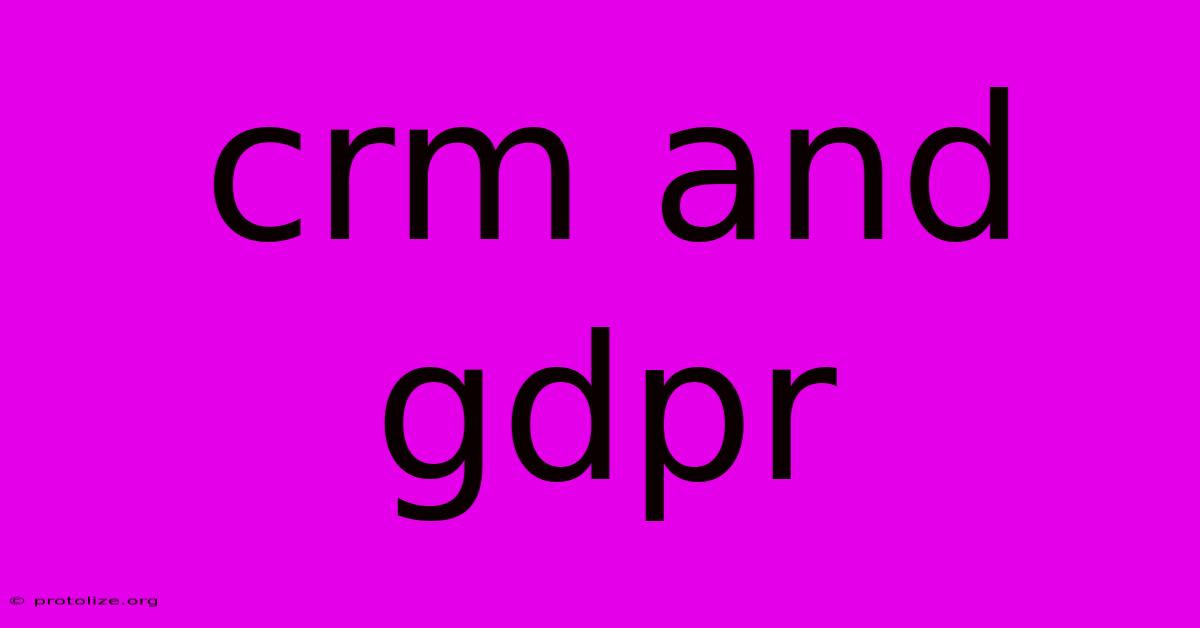Crm And Gdpr

Discover more detailed and exciting information on our website. Click the link below to start your adventure: Visit Best Website mr.cleine.com. Don't miss out!
Table of Contents
CRM and GDPR: A Guide to Compliance
The General Data Protection Regulation (GDPR) has significantly impacted how businesses handle personal data. For companies using Customer Relationship Management (CRM) systems, understanding and adhering to GDPR is crucial to avoid hefty fines and reputational damage. This guide explores the key aspects of GDPR compliance within the context of CRM systems.
Understanding the Intersection of CRM and GDPR
A CRM system, at its core, stores vast amounts of personal data about customers and potential clients. This includes names, contact details, purchase history, communication logs, and potentially even more sensitive information. GDPR dictates how this data must be collected, processed, stored, and protected. Failure to comply can lead to serious consequences.
Key GDPR Principles Relevant to CRM
Several key GDPR principles are especially relevant to CRM usage:
- Lawfulness, fairness, and transparency: Data collection must be lawful, fair, and transparent to the individual. Users must understand how their data will be used. Clear and concise privacy policies are essential.
- Purpose limitation: Data should only be collected for specified, explicit, and legitimate purposes. Your CRM's data collection should align precisely with your stated purposes.
- Data minimization: Only collect the data necessary for the specified purpose. Avoid collecting excessive or irrelevant information.
- Accuracy: Data should be accurate and kept up to date. Implement processes for data cleansing and correction.
- Storage limitation: Data should only be kept for as long as necessary. Establish data retention policies and regularly review and delete outdated data.
- Integrity and confidentiality: Data should be processed in a manner that ensures appropriate security, including protection against unauthorized or unlawful processing and against accidental loss, destruction or damage.
Ensuring GDPR Compliance with Your CRM
Achieving GDPR compliance with your CRM requires a multifaceted approach:
1. Data Mapping and Inventory
Conduct a thorough audit of your CRM data. Identify all personal data stored, its source, purpose of processing, and the legal basis for processing. This inventory will form the foundation of your compliance strategy.
2. Implementing Data Protection Measures
- Access Control: Implement robust access controls to restrict access to sensitive data based on roles and responsibilities. Only authorized personnel should have access to specific data fields.
- Data Encryption: Encrypt data both in transit and at rest to protect against unauthorized access.
- Regular Security Updates: Keep your CRM software and associated infrastructure updated with the latest security patches.
- Data Breach Response Plan: Develop a comprehensive plan to handle data breaches, including notification procedures for affected individuals and data protection authorities.
3. Consent Management
- Explicit Consent: Obtain explicit consent from individuals before collecting and processing their personal data. Ensure that consent is freely given, specific, informed, and unambiguous.
- Consent Withdrawal: Provide a clear and easy mechanism for individuals to withdraw their consent at any time.
- Consent Records: Maintain accurate records of all consents obtained.
4. Subject Access Requests (SARs)
Establish a clear process for handling SARs. This involves promptly responding to requests from individuals to access, rectify, or erase their personal data. This often involves exporting data in a structured, commonly used format.
5. Data Retention Policy
Implement a data retention policy that specifies how long different types of data will be kept. Regularly review and delete data that is no longer necessary.
6. Data Transfers
If your CRM involves transferring data outside the EEA (European Economic Area), ensure you comply with the appropriate transfer mechanisms, such as Standard Contractual Clauses or Privacy Shield (where applicable).
Choosing a GDPR-Compliant CRM
When selecting a CRM system, prioritize those that offer built-in GDPR compliance features such as:
- Data encryption
- Access controls
- Data portability tools
- Consent management features
Remember, simply choosing a compliant CRM is not enough. Ongoing monitoring and adaptation of your practices are crucial to maintaining compliance with evolving data protection laws. Regularly review your processes, policies, and data handling practices to ensure they continue to meet the requirements of GDPR.
Disclaimer: This article provides general information on GDPR compliance in relation to CRM systems. It is not a substitute for legal advice. Consult with a legal professional to ensure full compliance with GDPR in your specific circumstances.

Thank you for visiting our website wich cover about Crm And Gdpr. We hope the information provided has been useful to you. Feel free to contact us if you have any questions or need further assistance. See you next time and dont miss to bookmark.
Featured Posts
-
Historic Sichuan Teahouse Honored
Dec 09, 2024
-
War Monitor Assad Leaves Syria
Dec 09, 2024
-
West Fuels Cold War Says Russia
Dec 09, 2024
-
Quickbooks Crm
Dec 09, 2024
-
Freshsales Crm
Dec 09, 2024
